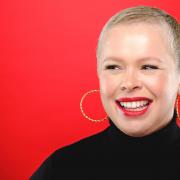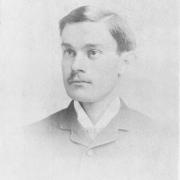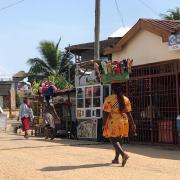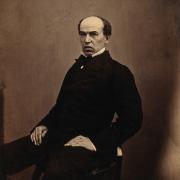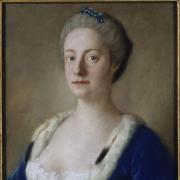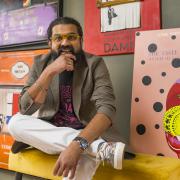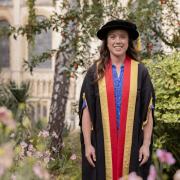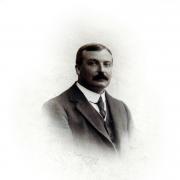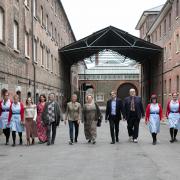Trevor Willmott, the new Bishop of Dover and Bishop in Canterbury, on music, cricket, the true meaning of Easter, and why he wants to meet Kent's farmers
Kent Character: The Bishop of Dover and Bishop in Canterbury
Trevor Willmott, the new Bishop of Dover and Bishop in Canterbury, on music, cricket, the true meaning of Easter, and why he wants to meet Kent’s farmers
The new Bishop of Dover and Bishop in Canterbury, the Right Reverend Trevor Willmott, is looking forward to immersing himself in the life of the diocese and to getting to know a county he’d previously only really glimpsed en route to its ferry ports.
Just a few days into his role when we met at the Old Palace, next to Canterbury Cathedral, Bishop Trevor was still beaming at the memory of his installation service. “It was hugely enjoyable, the cathedral was full and there were people from all walks of my life, even from before I was ordained, and every parish in the diocese was represented. My wife Margaret and I chose the music and I think David (Flood) and the choristers really enjoyed it.
“I have worked in two other cathedrals – Durham and Peterborough – so the life of a cathedral church, its music and worship, is very much part of my own life.”
As well as church music being a particular interest, Trevor and Margaret are passionate about opera and choral music, ballet, art and the theatre – so should find plenty to engage them in this most artistic of cities.
And the warmth of welcome has charmed them both. “I love Canterbury, it has a liveliness and a variety of people which is hugely engaging,” says Bishop Trevor. “The joy of walking outside this office and hearing languages from across the world being spoken is hugely enjoyable. People have been incredibly friendly, kind and helpful from the beginning – and not just because I’m dressed like a bishop.”
The comment about languages is an interesting one: Bishop Trevor doesn’t just have a musical ear, he has a great facility for languages as well. Originally from Plymouth, he left Devon when he was 17 to go to Oxford, where he read classics, and since then – either on his own or married - has travelled all over the world.
After university he went to Greece for two years to study at the University of Thessalonika in northern Greece, so has modern Greek as well as ancient. “I’m a linguist by background,” he says. “I can speak a little of a lot of different languages, which is good up to a certain point – then eventually people think I can speak more than I can and find me out, which is embarrassing!”
Ordained in St Alban’s, when Bishop Trevor completed his first four years of ministry there he was invited to take up a dual post with the Royal Navy and the church in Norway, so naturally learnt Norwegian. “Norwegian isn’t too difficult,” he tells me. “I find Danish the most difficult Scandinavian language and I can’t speak it yet, but the Archbishop does - so that’s my next challenge!”
After Norway, he went to what was then the second largest Nato base in Naples and looked after the Royal Navy and other nationalities across the southern Mediterranean base between 1979 and 1983 - which meant he was there during the Falklands War.
“It was hard, because all the arrangements for the Falklands were worked out through the Naples community, so there were people who died on the Sir Galahad that I knew personally. It was a painful, demanding time,” he says.
“I then came back to the UK in 1983 and have remained very much committed to the life of our forces across the world and will continue in Canterbury, where there are big military establishments. I am looking forward to serving them.”
Before the call to Canterbury, Bishop Trevor, 59, had been in position as Bishop of Basingstoke in the Diocese of Winchester. Did he have an inkling what lay in store for him?
He smiles. “I had been in my previous post for seven years and was aware that people were beginning to ask the question, is Trevor going to stay where he is or take up another appointment?
“The invitation to come to Canterbury was a huge bolt out of the blue, but a very welcome one. It took place as a series of conversations, but the final part was a telephone call from the Archbishop himself.”
Bishop Trevor’s first introduction to the diocese by Dr Rowan Williams was in the setting of an arable and hop farm in Bekesbourne, where he was presented with bouquets of Kentish hops.
“I was asked where I would naturally feel at home,” he explains, “so that was either among rural communities or with those who live on the margins of society.”
The interest in rural life developed while he was based in Hampshire, when the questions about whether the UK wants to eat food it can produce or continue to buy cheaper food from other parts of the world were first aired.
Canterbury has a liveliness and a variety of people which is hugely engaging
“Our rural communities have been marginalised and neglected by an ever-increasing urban model of life in this country,” he says. “One of my roles as bishop is to speak out on behalf of the whole of society, and most particularly for those in rural communities.
“So I am very keen to hear how Kentish farmers are getting on and if I can help by bringing a spotlight of interest and commitment to their work, then I am delighted.”
And helping those on the edge of society is equally important to Bishop Trevor, who first went into a penal establishment when he was 17 and has continued to work with prisoners in our judicial system throughout his ministry. He looks forward to developing the theme in Kent and has early visits planned to the prisons on Sheppey and to Maidstone.
The founding trustee for Emmaus Hampshire, Bishop Trevor has also been much involved with Emmaus communities in his work and is pleased that there is one in Dover. “It’s about long-term care for the homeless, they form communities of men or women who are unemployed and the aim is over two or three years to help restore dignity and help them find a new way of life, often through learning a trade, such as restoring furniture,” he explains.
“The name is taken from the story of Jesus walking along the Emmaus Road and meeting the disciples who are dejected and lonely and bringing them hope. The aim is to come alongside those who are homeless and to give them encouragement. It stands as a judgement on us as a society how we care for those most on the margin and is work for us all of us to be concerned about.”
As we approach Easter, I ask the bishop if he has a message of hope connected with this special time of year. “Easter is about new life, new opportunities, new relationships and new beginnings, but each of those new opportunities comes out of the recognition of the failure of the past and working through that failure,” he says.
“So Easter isn’t just an avoidance of the past, as out of the difficulties comes hope and I can begin to see some signs of hope around me – for example, the way we are trying to bring peace to the people of Afghanistan. In my installation service, I spoke about the stories of some of those men returning from that country with the most appalling injuries yet still remaining hopeful, still committed to peace. And that I think is a message for Easter – we can each do our part in bringing hope or peace to our neighbour.”
For Bishop Trevor it will be a busy but rewarding time. Visiting parishes in Holy Week, he will be in a prison early Easter Sunday morning and on Easter Monday will take part in the diocesan youth pilgrimage.
“People say I am happiest if I am in a school,” he says. “I like working with the questions young people ask. It’s important for us all to realise that young people are part of today and not, as some people say, all about tomorrow – they are today’s people and we need to listen to them, and work with them.”
The issue of women and gay bishops has been much in the news and I ask Bishop Trevor about his own views. He is diplomatic but firm in response. “The challenge to the church is to be one church, to recognise difference but to be able to acknowledge it.
“If it is appropriate that women are called to be bishops, the church as a whole has said that is the right thing to do. But it must be handled sensitively, by listening to each other, and I hope and pray that we will be able to achieve fairness – which is to have women as bishops, but also to be a church in which those who find that difficult will themselves continue to flourish.”
Father of a grown-up daughter, Elizabeth, the bishop adds: “I hold very firmly to marriage as the natural way for men and women to express their sexuality. I think the church and all of us at times have been homophobic, we have said things and done things to people for which we should seek forgiveness. I want to be a church that welcomes everybody, but one in which we have set ways of living to which we are called.”
There is also much to look forward to in his first year in Kent, from joining the Lord Warden as his new chaplain to the Cinque Ports, to finding out about which issues people really want to talk about – how new communities like Ashford are continuing to grow, and how some of Kent’s coastal towns are finding a new identity.
Then there’s rugby and cricket (he describes himself as “passionate” about cricket, so is anticipating many happy hours following the progress of the Kent Cricket Club), and his favourite hobby: entertaining and cooking. “I love oysters, so I can’t wait for the Whitstable Oyster Festival,” he laughs.
The couple already seem extremely happy, living just 10 minutes from ‘the office’, and Margaret quickly found work in Canterbury as a school finance consultant, so does Kent feel like home yet?
“I was in London all last week for General Synod and on Friday afternoon when I came to leave, I thought, I’m catching the train and I’m going home – I’m going home to Canterbury. I felt it instantly.”



